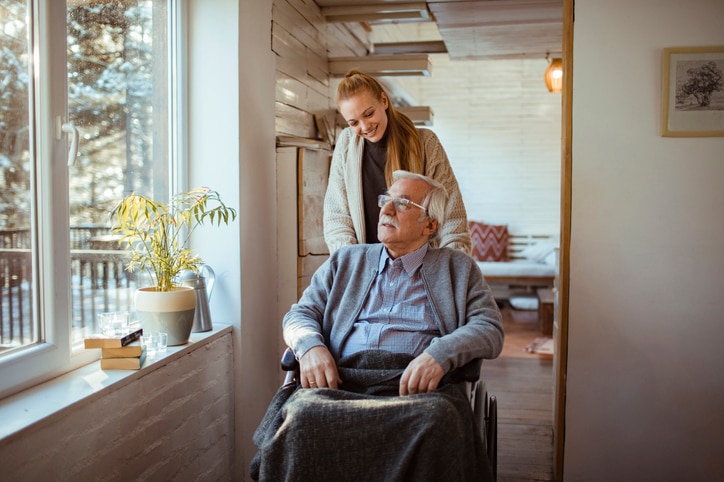Younger people often assume that getting older and becoming less active is, well, depressing. But this is a misconception, and depression shouldn’t be considered part of the natural aging process, says Dr. Moria Smoski, an associate professor in the psychiatry and psychology departments at Duke University.
Still, depression is something people of all ages — including seniors — can struggle with, and certain aspects of aging can trigger loneliness and depression in seniors. If you have an aging parent or care for a senior loved one, here’s what the experts say about the causes and signs of these struggles in older adults, plus ways you can help them cope.
Common causes of depression in seniors
Depression is the most common mental health disorder, according to the American Psychiatric Association, and it can impact any age for numerous reasons, from genetics to brain chemistry to environment.
“Depression in older adults is actually often less common than in middle age,” Smoski explains. That may be partly due to a shift from focusing on productivity and delaying enjoyment to slowing down and cherishing life with loved ones, she says. “As that shift happens, our ability to continue to enjoy life is fairly preserved, and the sharpness of our negative emotions can have some of the edge taken off.”
“Depression in older adults is actually often less common than in middle age.”
— Dr. Moria Smoski, associate professor in the psychiatry and psychology departments, Duke University
However, certain life experiences can trigger depression in seniors:
- Retirement. The transition from working life into what’s next is difficult, Smoski says, especially those who derived a lot of purpose from their work.
- A health change. Developing a physical problem or permanent disability can contribute to depression, Smoski notes, especially if the person can no longer do a beloved activity like tennis.
- Isolation. Retiring and becoming less active can lead to social isolation. This doesn’t necessarily lead to loneliness, Smoski says, especially for those comfortable with alone time. For others, isolation can lead to loneliness and even depression. However, Smoski points out that depression can cause people to socially isolate, so it can go both ways.
Signs of loneliness in elderly
Beverly Sanborn, a gerontologist and vice president of program development at Belmont Village Senior Living, adds that while depression can cause any age group to feel sadness, emptiness, and hopelessness, certain signs are more common with older adults. And Smoski adds that while it’s normal to have a bad day here and there, frequent or lasting changes in behavior or mood can signal depression.
That said, caregivers should take note of any of the following red flags, according to both Smoski and Sanborn:
- Reduced or absent interest in hobbies or activities previously enjoyed, like reading or following a sports team.
- Changes in sleep and/or appetite.
- Withdrawing socially.
- Physical aches and pains.
- General apathy and malaise.
- Hyperirritability.
- Sleeping too much or too little.
- Memory loss that’s not related to dementia.
Ways older adults can help address depression and loneliness
Here’s the good news: There are plenty of proactive and reactive ways to help older adults avoid depression and loneliness. Here are some of the best ways to keep spirits lifted.
Maintain connections
Strong social connections can literally be lifesaving for seniors, and Smoski emphasizes quality over quantity. “Someone can be fairly socially isolated, but not feel lonely, since there are some folks who really like their solitude,” Smoski explains. “Also, someone can legitimately feel lonely even if they’re surrounded by people if they don’t feel connected.”
“…Someone can legitimately feel lonely even if they’re surrounded by people if they don’t feel connected.”
— Dr. Moria Smoski
Because connection is so crucial, Lisa M. Cini, an aging expert and author, recommends that caregivers or loved ones who can’t visit in person schedule consistent times to bond with their older loved ones, daily if possible, and with video so it feels more personal. (Bear in mind that discomfort with technology can be a barrier for some seniors, Smoski says. “Caregivers should remember that even if you’ve shown it to them once, you may want to walk through it a couple times until they’re comfortable using it,” she says.)
Yolanda Lopez can attest to the power of prioritizing one-on-one time with older loved ones. Before retirement, when she only visited her parents on weekends, she could tell they were becoming lonely and depressed. Lopez has siblings, but they weren’t very involved.
“After I retired and became the sole caregiver of them both, they both seemed so much happier just to know that I was coming,” she says. But it took a toll on her, so she asked her siblings to help her more, spend more time with the parents and occasionally take them on outings. Lopez says it’s clear how much the increased connection has eased their loneliness and depression.
Focus on happy memories
When the present is difficult, help your loved one relish and capture meaningful memories, like signing them up for StoryWorth, which asks customizable questions weekly, then compiles them into a book at the end of the year. A few more ideas, according to Cini:
- Have family members mail the older loved ones cards sharing their best memories together.
- Ask your loved one to share their favorite recipe and then cook them and send photos of the final result.
- Encourage the senior to pick out some of their favorite old photos and tell you all about them. You could even compile these images into a family history book.
Practices like these can be especially helpful for some people with cognitive issues, Cini says. They may “go back in time,” and their reality may not be the same as yours, she adds, but rather than arguing, they’ll feel more comfort and connection if you meet them where they are and play along. “You may even pull out scrapbooks and look at old photos and reminisce together,” she says. “Let them tell you stories about whatever they want, and actively ask questions.”
Utilize tech devices
In addition to video calls, there are plenty of other creative tools to foster connection and reduce loneliness. There’s Aura, a digital photo frame that operates over Wi-Fi and allows loved ones to add photos via an app from anywhere. Or Lovebox, a device that lets you send one-way digital messages to loved ones in a physical wooden box.
You could also buy a companion device, which is a robot that looks like a stuffed cat or dog but responds to touch and care, says Cini. And if your loved one is tech-savvy, they might enjoy playing online games (like Words With Friends) with you.
Look for meaning and purpose
One of the best ways to help decrease loneliness is to make them feel like they’re contributing or making a difference in someone’s life, Smoski says. This could mean finding opportunities for formal volunteering, quizzing their grandkids on spelling once a week or fixing something for a loved one.
If the senior seems bored, help them find an interest or goal outside of themselves, Sanborn suggests. Maybe they would like to learn more about the recycling program in their community or work on an op-ed for a local paper. Even just writing in a gratitude journal at the end of each day can help seniors practice optimism and lift mood, adds Sanborn.
Encourage healthy habits
Ensure your loved one is getting regular exercise. Sanborn encourages outdoor walks when possible since walks in nature are proven to benefit mood.
If the senior has impairments, even chair exercises are beneficial, Cini says. She also recommends ensuring older adults reduce or stop consuming sugar and alcohol and taking enough vitamin D or using light therapy if they don’t get enough sunlight.
Seek medical intervention
If none of these tactics help, Smoski recommends setting up a telemedicine or in-person visit with your loved one’s primary care physician. They may be able to help treat the depression, and if not, advise further steps, such as medication or seeing a mental health professional.
The bottom line on bolstering older adults’ mental well-being
Growing older and wiser has plenty of benefits, but it also comes with challenges that can be difficult for some seniors to cope with. By keeping an eye out for signs of depression and loneliness, and by proactively keeping your loved one connected, healthy and engaged, you can help ensure their golden years are truly golden.






